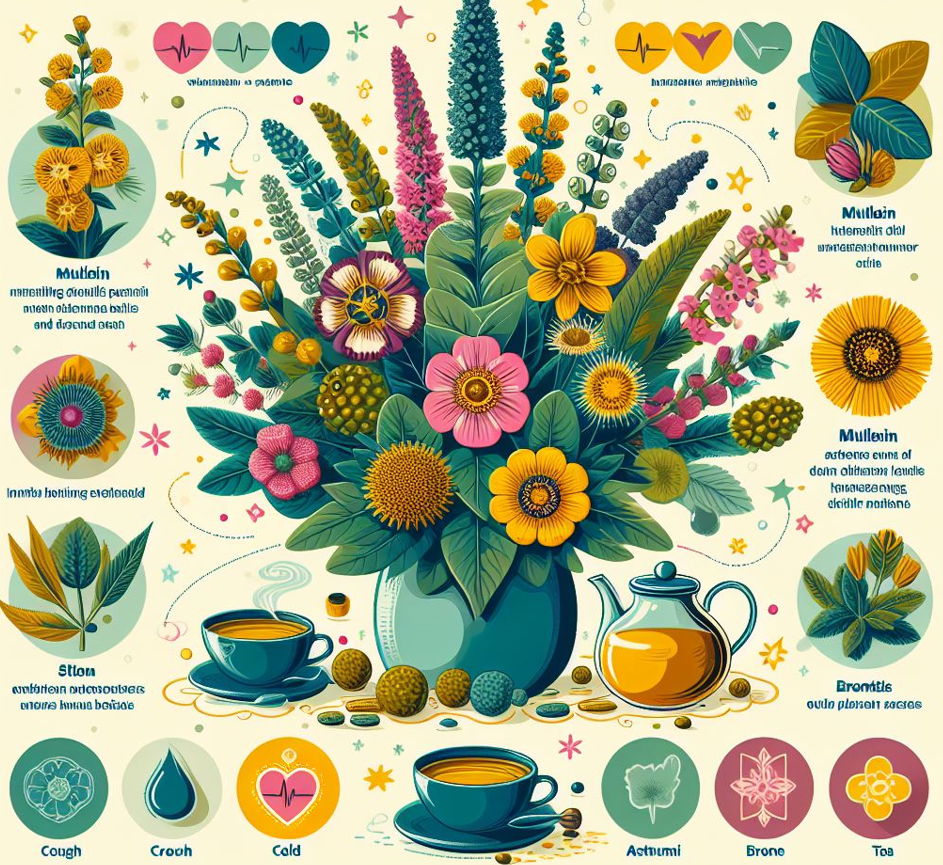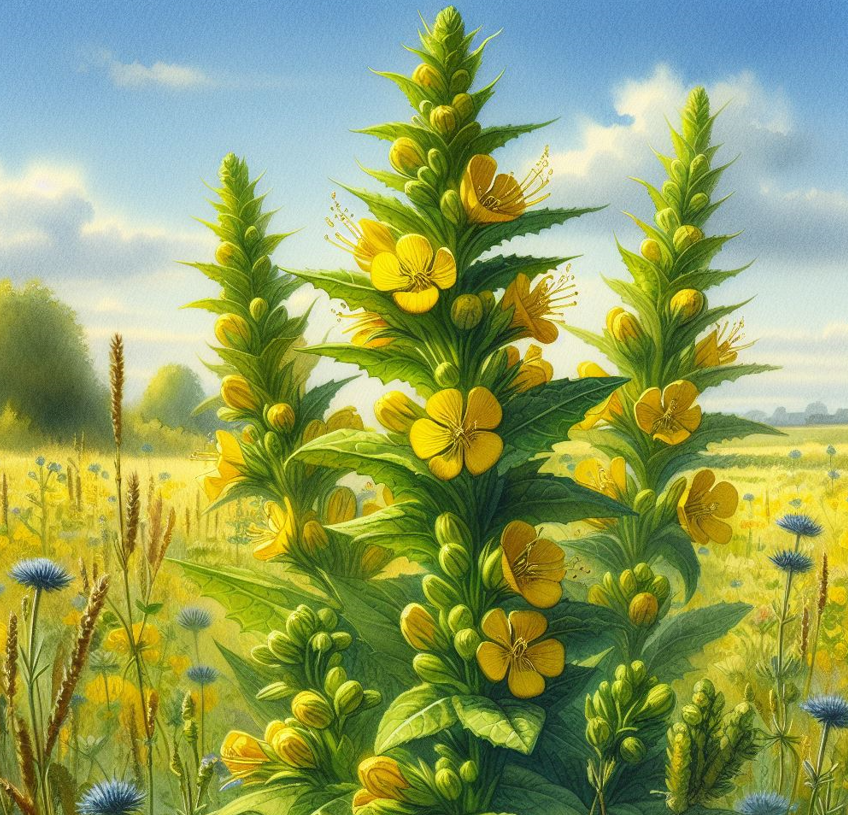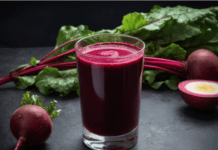Mullein is a versatile herb used for centuries to treat various ailments, especially respiratory problems. We will discuss how it works and how to use it for different purposes. You will also discover some of mullein’s benefits and side effects and how to make your mullein tea and oil at home.
What Is Mullein?
Mullein is a common name for over 300 species of plants in the genus Verbascum, which belong to the snapdragon family. The most widely used species is Verbascum thapsus, also known as common mullein or Aaron’s rod.
It is a biennial or perennial plant that grows up to 7 feet tall and has large, velvety leaves and yellow flowers. Mullein is native to Europe, Asia, and Africa but has been naturalized in many parts of the world, including North America.
How Does Mullein Work?
Mullein contains various medicinal compounds, such as flavonoids, saponins, glycosides, mucilage, and minerals. These compounds may have anti-inflammatory, antioxidant, antiviral, antibacterial, and expectorant effects, meaning they can help reduce swelling, fight free radicals, kill viruses and bacteria, and loosen mucus.
Mullein may also have diuretic, sedative, and analgesic effects, which can help increase urine output, calm the nerves, and relieve pain.
How to Use Mullein for Respiratory Health
Mullein is one of the most popular herbs for respiratory health, as it can help ease coughs, colds, asthma, bronchitis, pneumonia, and other lung-related conditions. Mullein can be taken internally as a tea, capsule, extract, or oil or applied externally as a compress, poultice, or salve.
Here are some of the ways you can use mullein for respiratory health:
Mullein Tea
Mullein tea is a soothing and nourishing drink that can help relieve sore throat, cough, hoarseness, and bronchitis. To make mullein tea, steep 1-2 teaspoons of dried leaves or flowers in a cup of boiling water for 10-15 minutes. Strain and drink up to 4 cups per day. Add honey, lemon, or ginger for extra flavor and benefits.
Mullein Capsule
Mullein capsule is a convenient and standardized way to take mullein internally. You can find mullein capsules in health stores or online or by filling empty gelatin capsules with dried and powdered mullein leaves or flowers. The typical dosage is 500 mg, taken three times daily, but you should follow the instructions on the product label or consult your doctor before using.
Mullein Extract
Mullein extract is a concentrated liquid form of mullein that can be taken by mouth or added to water, juice, or tea. You can buy mullein extract in health stores or online or make your own by soaking mullein leaves or flowers in alcohol for several weeks. The usual dosage is 1/4 to 3/4 teaspoon taken 3-4 times per day, but you should follow the instructions on the product label or consult your doctor before using.
Mullein Oil
Mullein oil is an herbal remedy for ear infections, pain, and inflammation. For several weeks, you can buy mullein oil in health stores or online or make your own by infusing mullein flowers in olive oil. To use mullein oil for ear infections, warm the oil slightly and put 1-2 drops in the affected ear 2-3 times daily.
For ages 1-10, use 1 drop, and for ages over 10, use 2 drops. Do not use mullein oil if your eardrum is perforated or if you have an allergic reaction to the oil.
Mullein Compress
Mullein compress is a warm and moist cloth that can be applied to the chest, throat, or sinuses to help reduce inflammation and congestion. To make a mullein compress, soak a clean cloth in hot mullein tea and wring out the excess liquid. Cover the cloth over the affected area with a towel or plastic wrap. Leave it on for 15-20 minutes and repeat as needed.
Mullein Poultice
A mullein poultice is a thick paste of mullein leaves or flowers that can be applied to the skin to help heal wounds, burns, bruises, and hemorrhoids. To make a mullein poultice, crush fresh or dried mullein leaves or flowers and mix with enough water to form a paste. Spread the paste over the affected area and cover with a bandage or cloth. Leave it on for several hours or overnight and change as needed.
Mullein Salve
Mullein salve is an herbal ointment that can be used to moisturize and protect the skin, as well as treat skin infections, rashes, and irritations. You can buy mullein salve in health stores or online or make your own by melting beeswax and adding mullein oil and other essential oils. Pour the mixture into a jar or tin and let it cool and harden. Apply the salve to the skin as needed.
- USDA Organic Mullein Drops – Unleash the power of mullein drops for lungs in every drop for unparalleled effectiveness. Packed with potent compounds, each drop ensures impactful results. Mullein drops are gentle on the stomach and throat and meet strict USDA standards for organic production, including using organic ingredients & adherence to organic farming practices.
- Lung & Bronchial Cleanse – Experience the revitalizing power of organic Mullein, as it naturally supports your lung health and aids in cleansing your respiratory system. Breathe easy and feel the difference as your lungs are renewed with every drop of mullein leaf organic supplement.
- Respiratory Health – Elevate your respiratory wellness with Mullein extract. Lung cleanse drops are crafted to promote clear airways and optimal lung function. Mullein extract for lungs provides a natural solution for maintaining robust respiratory health. Breathe freely and comfortably with the support of natural botanical treasures.
- Natural Formula – USDA Organic, NON-GMO & sugar-free, alcohol-free vegan mullein leaf drops! Mullein leaf extract drops are manufactured in the USA using advanced technology to ensure the finest quality! That's why every drop of lung cleanse liquid supplement is safe, effective, and meets industry standards.
- Made with Care & Love – At NUTRAHARMONY, we desire to provide you with quality and outstanding service. If, for any reason, you are not happy with mullein leaves drops, just let us know! Drop a message to our support team to share your outstanding experience with mullien!
- OUTSTANDING VALUE / 4 MONTH SUPPLY: Our Extra Strength Mullein Extract contains 3000 mg strength per capsule AND 120 capsules per bottle – an amazing value! A single bottle contains up to a 4 month supply. Compare this to other leading brands that require 2 capsules per serving, contain less than 120 capsules, and use a much less potent, non-extract powder. Our Extra Strength Mullein Extract is a bargain not be found elsewhere!
- 3000 MG STRENGTH / HIGH STRENGTH DOSAGE: Our Extra Strength Mullein Extract is the strongest dosage available! Each capsule contains 3000 mg strength of Mullein Extract made from a potent, powerful 10:1 extract.
- NATURAL, VEGAN & NON-GMO: All ingredients, including the capsule, are 100% vegan. Our Extra Strength Mullein Extract does not contain any sweeteners, artificial flavors, wheat, corn, gluten, soy, milk, egg, fish, shellfish, or tree nut ingredients. Enjoy the amazing benefits of our potent Mullein Extract without worrying about what else might be hiding in each capsule!
- GOLD STANDARD PRODUCTION: Your health and safety mean everything to us. For that reason, our Extra Strength Mullein Extract is manufactured in the USA, in a fully certified facility with adherence to good manufacturing policies and under the most stringent quality control. You can rest assured that you get the best value for your money!
- 100% VEGETARIAN / VEGAN: All ingredients, as well as the capsules, are 100% vegetarian, and made from the purest sources available. The capsules are made from all-natural cellulose, derived from plants.
- Pure mullein leaf and flower extract from Herbify is very close in effect to Echinacea. Our Mullein tincture supports lung cleansing. Absolutely essential product for smokers and health conscious people. Mix it with water and support healthy breathing.
- Powerful lung complex blend provides significant improvement for your respiratory system. We use the finest leaves and flowers of Mullein herb. Enjoy the liquid supplement with the highest concentration of Mullein.
- Taking Mullein in a liquid form is 3 times more effective than talking powder. It quickly works to improve your digestive system, immunity, and overall well-being. As well as long-lasting lung health, throat, and bronchial cleansing
- Herbify is made in the USA with a lot of pride. We are based in Florida and use American ingredients as much as possible. We at Herbify have strict quality control, check our sources, and value Love & Trust for our brand above everything else.
- Unhappy with our product? Reach Out Directly to Make It Right! - If our product falls short of your expectations, please contact us directly for a prompt solution. Ensuring your satisfaction is our highest priority. With us, enjoy a seamless shopping experience where your health and well-being are of utmost importance. Should the anticipated benefits not materialize, our hassle-free return policy, complementing Amazon’s A-to-z Guarantee, offers a straightforward money-back process.
- 100% wild harvested mullein, and no chemicals are used during the entire growth process
- The raw material is 100% pure mullein leaves, no stems and no impurities.
- Mullein leaf raw material 100% natural, no additives and no flavoring. Pure herbal taste.
- Mullein tea tastes mild and soothing, and the tea bags can be reused several times. It has many benefits for the human body.
- Perfect after-sale service, we have confidence in our products, if you have any dissatisfaction after receiving our mullein tea bags,please contact us via Amazon mail, we guarantee you a refund or Reissue service, 100% solve the problem for you.
- 15-in-1 Lung Complex — Experience the ultimate lung detox & cleanse with respiratory support! With our comprehensive blend featuring 15 essential ingredients, including Mullein leaf extract, Marshmallow, Oregano, Echinacea, A-acetyl Cysteine & Bromelain, our Mullein extract lungs support supplement is designed to support optimal health and well-being.
- Respiratory & Bronchial Support — Mullien herbal complex promotes lung health, and enhances detoxification & antioxidant defense while providing mucilaginous comfort & gentle smokers lung cleanse. Mullein leaves capsules support bronchial health, resulting in respiratory clarity. Mullien leaf complex bolsters immune function & offers respiratory support against environmental stressors
- Antioxidant Herbal Blend — Nurture your lungs with nature's finest herbs and nutrients in our blend. With powerful ingredients like Mullein, Quercetin, Turmeric, Vitamin C, Zinc, Olive Leaf, and Holy Basil it works synergistically to provide essential lung detox, lung cleanse, immune support, lung cleanse for smokers, and respiratory & bronchial health.
- Made in USA — Rest assured, our Mullein leaf lung detox supplement is proudly manufactured in the USA under strict quality control standards, Third Party Tested & GMP certified. We adhere to rigorous procedures to ensure every mullin leaf capsule batch's safety, purity, and efficacy. We use the most potent forms of each component for detox lung cleanse capsules to achieve maximum effect.
- Trustworthy Service — We are committed to providing exceptional customer service and transparency with NUTRAHARMONY’s carefully selected lung cleanse and detox multicomplex! Highest quality & purity to ensure the best results! With our mullen supplement, you can trust that you're receiving premium-quality mullen leaves capsules backed by scientific research and dedicated customer support!
Other Benefits and Uses of Mullein

Besides respiratory health, mullein may also have other benefits and uses, such as:
Digestive Health
Mullein may help improve digestive health by soothing the stomach, relieving constipation, and treating diarrhea. Mullein tea or capsule can be taken internally for these purposes.
Urinary Health
Mullein may help improve urinary health by increasing urine output, reducing inflammation, and fighting infections. Mullein tea or capsule can be taken internally for these purposes.
Nervous System Health
Mullein may help improve nervous system health by calming the nerves, reducing stress, and promoting sleep. Mullein tea or extract can be taken internally for these purposes.
Musculoskeletal Health
Mullein may help improve musculoskeletal health by relieving pain, inflammation, and stiffness in the joints and muscles. Mullein tea, capsule, extract, oil, compress, poultice, or salve can be used for these purposes.
Immune System Health
Mullein may help improve immune system health by boosting the body’s defenses against viruses, bacteria, and other pathogens. Mullein tea, capsule, extract, or oil can be taken internally for these purposes.
Skin Health
Mullein may help improve skin health by softening, moisturizing, and protecting the skin, as well as healing wounds, burns, bruises, rashes, and irritations. Mullein oil, compress, poultice, or salve can be applied to the skin for these purposes.
Hair Health
Mullein may help improve hair health by adding shine, color, and strength to the hair. Mullein oil or tea can be applied to the hair for these purposes.
Side Effects and Precautions of Mullein
Mullein is generally considered safe and well-tolerated, but some people may experience side effects or allergic reactions, such as:
-
- Skin Irritation: Some people may develop skin irritation, rash, or contact dermatitis from applying mullein to the skin. To avoid this, do a patch test before using mullein on a large area of skin, and discontinue use if you notice any adverse reaction.
- Throat Irritation: Some people may experience throat irritation, coughing, or choking from drinking mullein tea or taking mullein capsule or extract. This may be due to the fine hairs on the mullein leaves or flowers, which can irritate the mucous membranes. To avoid this, strain the tea well before drinking, and choose products that are made from finely ground or filtered mullein.
- Drug Interactions: Mullein may interact with certain drugs, such as antidiabetic drugs, diuretics, muscle relaxants, and lithium. Mullein may enhance or reduce the effects of these drugs, which can lead to unwanted or dangerous consequences. To avoid this, consult your doctor before using mullein if you are taking any medication, and monitor your blood sugar, blood pressure, and mood levels closely.
- Pregnancy and Breastfeeding: There is not enough evidence to determine the safety of mullein during pregnancy and breastfeeding. To be on the safe side, avoid using mullein if you are pregnant or nursing, or consult your doctor before using.
How to Make Mullein Tea and Oil at Home
-
- If you want to make your own mullein tea and oil at home, here are some simple steps to follow:
Mullein Tea:
-
-
- To make mullein tea, you will need dried mullein leaves or flowers, boiling water, a teapot or a mug, a strainer, and optionally, honey, lemon, or ginger for flavor. Here is how to make mullein tea:
- Place 1-2 teaspoons of dried mullein leaves or flowers in a teapot or a mug.
- Pour 1 cup of boiling water over the mullein and let it steep for 10-15 minutes.
- Strain the tea through a fine-mesh strainer or a cheesecloth to remove the fine hairs and any debris.
- Add honey, lemon, or ginger for flavor if desired, and enjoy your mullein tea.
- To make mullein tea, you will need dried mullein leaves or flowers, boiling water, a teapot or a mug, a strainer, and optionally, honey, lemon, or ginger for flavor. Here is how to make mullein tea:
-
Mullein Oil
- Hot Oil Extraction:
- Combine 1 cup of mullein flowers with 1/2 cup of olive oil in a glass double boiler over a low flame.
- Heat the mixture slowly for about three hours, stirring occasionally.
- Allow the oil to cool and then strain it using cheesecloth to remove all plant parts.
- Pour the strained oil into dark glass bottles and seal tightly.
- Store the oil in a cool, dark place and use it as needed for ear infections, skin problems or other conditions.
- Cold Oil Extraction:
- Cover the mullein flowers with olive oil in a glass jar with a lid, making sure the flowers are completely submerged.
- Set the jar on a sunny windowsill and let it steep for 7 to 10 days, shaking it daily.
- Strain the oil using cheesecloth and transfer it to dark glass bottles.
- Seal the bottles tightly and store them in a cool, dark place.
- Use the oil as needed for ear infections, skin problems or other conditions.
The above procedure can be also used to make mullein garlic oil
Final Thoughts
In summing up the multifaceted aspects of mullein, it’s clear that this herb, known scientifically as common mullein, offers a wealth of benefits. The mullein plant, with its distinctive mullein flower, has been used in various forms, from mullein leaf tea to mullein extract. Each part of the plant, be it the mullein leaf or flower, contributes to its holistic utility.
Mullein tea benefits, derived from the infusion of its leaves, are well-regarded in herbal circles, often celebrated for respiratory support. Similarly, mullein leaf benefits extend to its use in smoking blends, providing a smoother experience. Mullein garlic oil, a unique combination, leverages the properties of both garlic and mullein, making it a popular choice for ear-related issues.
Mullein pills and mullein drops offer a more convenient way to incorporate this herb into daily wellness routines. Additionally, the soothing properties of mullein herb have been encapsulated in various products, like mullein extract, enhancing its accessibility and ease of use.
Overall, mullein stands out as a versatile and beneficial herb, adaptable in various forms, from teas to oils, catering to a range of wellness needs.














